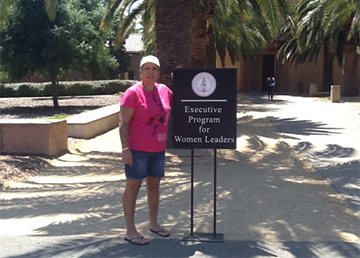Although my professional development 2015 calendar didn’t include the opportunity to go to one of the most prestigious universities in the world.
I was fortunate enough to be chosen for a mission to Stanford University. I accepted the challenge to go and represent my iwi at this prestigous whare of knowledge.
On 2 May. What an adrenahlin rush. It was a rough flight, a full 12 hours of shaking, from Auckland to San Francisco. Liz Cunningham and Joanne Mclean had a sleepless flight too. Luckily I had made a special visit to my hāhi Hēpara Pai prior to flying – this relieved some of my anxiety to ensure that I would return home to my whānau safe and well.
I hadn’t travelled past Australia, so I found going through American international customs an intimidating experience. I heard a voice say, “Shoes off, jackets off, belts off, eyes straight looking forward, all ten fingers in the printed area, arms up behind the head, (in an arrested position),” and then a full internal and external body scan is sychronised through a monitoring machine – it was scary. “Move forward mam,” said the intimdating customs security officer with loaded guns and dogs at his side. It wasn’t the most calming entry to San Francisco.
Mahi kāinga and preparation of academic readings needed to be completed, I was expected to be 100% focused, my brain switched on, Vania Pirini – Ko Ngāi Tahu te iwi – Stanford University bring it on.
The content of the programme was delivered by professors who had a high calibre of expertise from negotiating techniques, reaffirmation of organisational movements, high and low powerplays, design thinking, transparent accountability, leadership accuracy, the function of the brain, physiological arousal, and who you are and the neurotransmitters in the brain.
It is a future investment for Ngāi Tahu emerging leaders sharing new skills. This will develop new attributes of knowledge, challenges, success, unique visions and doors of interconnectedness between influence, strategy and operations aligning to my working environment.
The architecture of well-being in an organisation is crucial to enhancing cultural significance. My mahi and commitment to my tribe has allowed for me to have a strong connection to culture and identity, enhancing a full whānau centred approach and sharing these new skills will be rewarding.
Being passionate about your mahi makes a difference in how you approach your day-to-day routine. This also effects your performance from the beginning to the end of a day and is dependent on you as a person, your environment, how you work to get results – strong impacts and high outcomes.
Acknowledging Aoraki and where you are from is an identity statement that is embedded in my outlook of life. Whatever I do and wherever I go with my professional movements, these attributes are key.
The voyage of regaining our land, water and mahinga kai, I praise my tūpuna Uncle Joe Waaka, Aunty Kera Brown and Uncle Jacko Reihana. Acknowledging these profound Arowhenua/Ngāi Tahu tūpuna through this Arowhenua era, has left a legacy of identity and is an example of how I want to paddle my waka of success for my iwi. Nā Vania Pirini.

The group of women who travelled to Stanford to be a part of the leaders’ programme.

Vania Pirini.